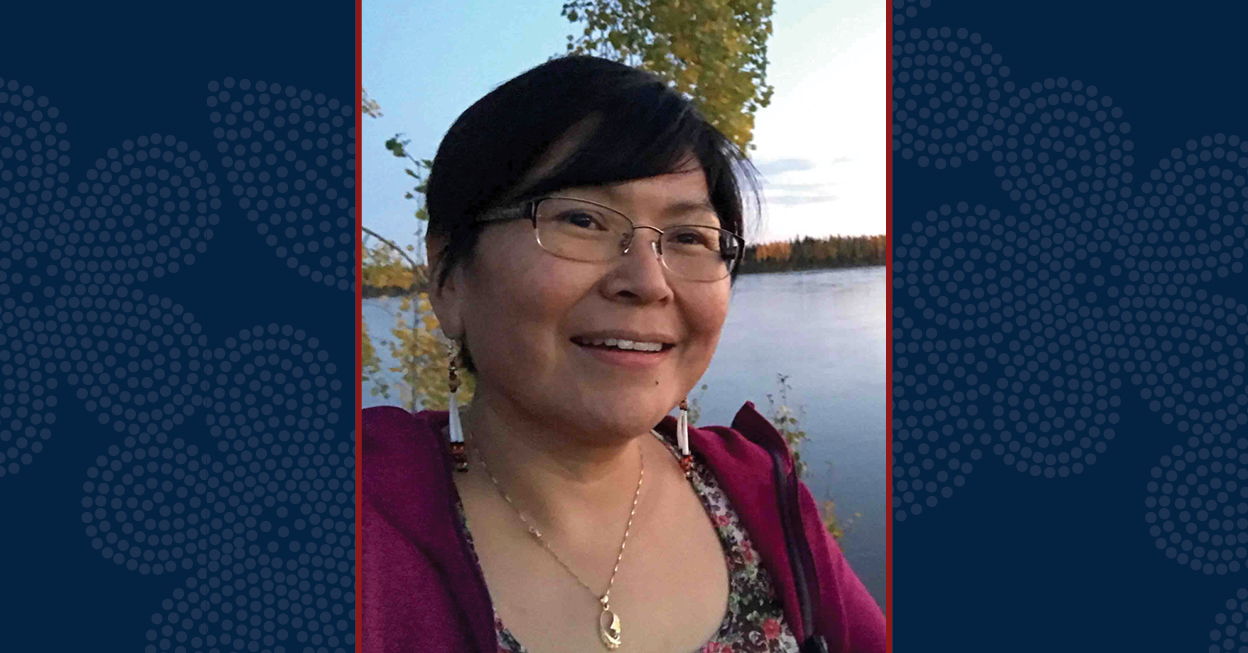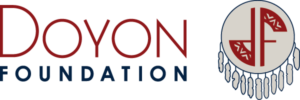
“I am a lifelong learner. Baasee’ for supporting me”
A school district administrator for the Fairbanks North Star Borough, Bev Kokrine is a veteran educator who’s pursuing a doctorate in Indigenous studies at the University of Alaska Fairbanks (UAF). She is an active supporter of the mission of Doyon Foundation as it works to enhance the lives of shareholders through educational, career and cultural opportunities.
Bev’s parents are the late Franklin and Lillian Simon of Huslia. Her paternal grandparents are the late Edwin and Lydia Simon of Huslia; maternal grandparents are the late Grafton and Agnes Koyukuk of Allakaket.
Doyon Foundation: Your efforts to advance the work of Doyon Foundation are inspiring, Bev. How did you become involved in Doyon Languages Online, the Doyon Foundation project to help people learn the Alaska Native languages of the Doyon region?
Bev Kokrine: I was hoping to learn more Denaakk’e and when the opportunity to work with Doyon Languages Online came up, I was thrilled.
My late mother and her sisters, cousins and close friends would speak Denaakk’e and giggle; they had a bond through the language and I wanted to share the joke but my siblings and I didn’t learn the language except for a few words. I do remember “wash the dishes.” My emotion was tied to that phrase and I remember it well!
DF: How do those early experiences help shape your work as a content creator with Doyon Languages Online?
BK: Listening to mom and dad speak the language was music to my ears. I admire any youth who can speak his or her Native language.
When I was living on the UAF campus as a student, I loved listening to my friends speak Yup’ik and today I enjoy listening to a friend sing in her Native language to her grandchildren.
I love the singing and dancing at the Koyukon Athabascan potlatches of Huslia, where I’m from. I love potlatches — I feel whole during the singing and dancing and I want to know the words being sung.
All these experiences inspire me to work with Doyon Languages Online because I hope someday we’ll hear more youth speaking Denaakk’e. They’ll know their culture and heritage if we teach them their Native language now.
DF: Walk us through some your tasks as a Doyon Languages Online content creator.
BK: I help develop conversation phrases by composing a dialog in English and then working with language experts who provide phrasing to express that dialog in sentences in Denaakk’e. Language experts including Eliza Jones, Susan Paskvan, Marie Yaska and Dewey Hoffman then help me say those sentences so they’re recorded. My mother shared her knowledge, too, and I’ve learned that even though she lived in Huslia for many years, her dialect is somewhat different because she was raised upriver in Allakaket.
DF: What attracted you to teaching? You earned a bachelor’s degree in education in 1992 from the University of Alaska Fairbanks and have worked in education ever since. That’s real commitment.
BK: I always wanted to be teacher, from the time I was little and playing school by lining up old gas can boxes, pretending they were student desks. Sometimes I’d play postmaster — my mother was village postmaster for 30 years — but usually I’d play the teacher role.
As a student in Huslia from kindergarten through 10th grade, I admired my Alaska Native teachers like Dorothy Jordan and Lois Huntington. I saw that it was important to let children know that they’re loved, cared for, valued, that they can achieve whatever they dream.
DF: You’re in your second year as an administrator with the Fairbanks North Star Borough School District. How did a love of encouraging children shape your career?
BK: I began as a preschool teacher with the Fairbanks Native Association, then director of its Head Start program and then was hired by the school district where I taught for 20 years, mostly in kindergarten. I love children. I’ve learned that the “difficult student” has a story to tell.
And I like to establish bonds with students and their families so they feel welcome to participate in the child’s education.
DF: Can you share some highlights from your teaching life? Things that might inspire future teachers?
BK: You never know whose heart you’ll teach as an educator! Once my sister and I were at the fair and I heard someone say, “Mrs. Kokrine?” It was a “challenging” student from my first year of teaching. That 6-foot young man gave me a big hug. My sister took our picture.
One summer I received a random phone call from a young woman whom I taught as a kindergartener. She found my number in the phone book. She just wanted to say thank you!
DF: How have Doyon Foundation scholarships helped you achieve your education and career goals?
BK: Baasee’ to Doyon Foundation for supporting me. It’s with Doyon Foundation help that I graduated as a young mother. That scholarship money goes a long way: I remember having $5 and treating my children to French fries and a place to play. I don’t take those sorts of memories for granted.
DF: How did being a Doyon Foundation scholarship recipient lead to your commitment to learn Denaakk’e?
BK: Doyon Foundation is doing good work in helping students with scholarships and advancing language revitalization. In both cases, Doyon Foundation is helping people reach their goals.
DF: You’ve said the youth and Elders are on your heart.
BK: It’s a thought that guides my plan for a second career after I retire from education. I want to use Denaakk’e while helping Indigenous students succeed in higher education, such as college or trade school.
My dream is for Elders to have company and for young adults to have housing as they attend college or trade school. It’s a struggle coming from the village. I know that role all too well.
My goal is to finish my doctorate in Indigenous studies at UAF. It’s a challenging program; after my mother died in 2019, I briefly felt like putting the PhD on a back burner. Then my husband reminded me that I’m working toward this degree not just for me but for our children, our nieces, our nephews. For the youth.
DF: What advice do you have for students thinking of going on to college or vocational training?
BK: Set goals, including daily goals for doing your homework.
My biggest challenge has been time management. I had to set goals to get my work done on time. Weekly goals and routines — for instance, setting aside time between 7 p.m. and 9 p.m. to do homework — can help you avoid falling behind. It takes self-discipline.
Do your homework as soon as you can after class while information is still fresh in your brain. Reserve time to edit your college writing once a paper is done. Find a healthy cohort of other students. They can help support your studies.
DF: What would you say to students who find they must interrupt their studies? It can be hard to pick up where they’ve off.
BK: I’d encourage students to keep coming back even if you’ve had a year off. Keep on working at your goals. Come back to school even if you’re working full-time and attending school part-time. Never give up.
DF: Things you like to do include hosting family dinners, traveling, photography, and learning about other cultures. Others to add to this list?
BK: Yes. I serve on the board of the Fairbanks Native Association and I’m a member of the Alaska Juvenile Justice Advisory Committee, a statewide group within the Alaska Division of Juvenile Justice.
I enjoy sharing about the Koyukon Athabascan potlatches specific to the Huslia area. Developing a protocol for these potlatches was the focus of my master’s degree project in education and these celebrations are important to me. I love the bonding, working together, and gift giving and feeding my soul. It’s a time of singing and dancing and honoring those who’ve passed on. These potlatches are part of who I am.
About Doyon Languages Online
Through the Doyon Language Online project, Doyon Foundation is developing introductory online lessons for Holikachuk, Denaakk’e (Koyukon), Benhti Kenaga’ (Lower Tanana), Hän, Dinjii Zhuh K’yaa (Gwich’in), Deg Xinag, Dinak’i (Upper Kuskokwim), Nee’anděg’ (Tanacross) and Née’aaneegn’ (Upper Tanana). The project officially launched in summer 2019 with the first four courses, now available for free to all interested learners.
Doyon Languages Online is funded by grants from the Administration for Native Americans (ANA) and Alaska Native Education Program (ANEP).
About our Language Champion profile series
As Doyon Foundation continues to grow our language revitalization efforts in the Doyon region, we believe it is important to recognize people who are committed to learning and perpetuating their ancestral language. We are pleased to share some of these “language champion” profiles with you.
If you know a language champion, please nominate him or her by contacting our language program director at haytona@doyon.com. Language champions may also complete our profile questionnaire here. You may learn more about our language revitalization program on our website, or sign up to access the free Doyon Languages Online courses here.
